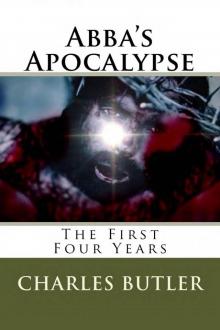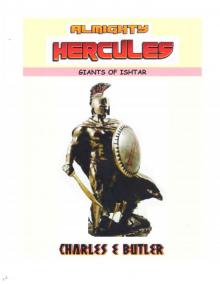- Home
- Charles Butler
Calypso Dreaming Page 2
Calypso Dreaming Read online
Page 2
Davy produced a keyring from his pocket.
“What castle dungeon did you get that from?” Hilary asked with a gasp.
Davy looked apologetic. “John likes the drama of it, I think – the old cellar door, this is, with a lock to match.”
“Isn’t John in?”
“Didn’t he tell you?” asked Davy Jones in surprise. “He left two days ago.”
“He what?”
“They changed the date of his cruise at the last minute. It was panic stations here, I can tell you! Didn’t he get in touch?”
“He did not!” groaned Geoff. “He was meant to be spending this week showing me the ropes. What am I going to do now?”
“I’m sure you’ll get the hang of it,” said Davy. “This was my uncle’s house – I more or less grew up in it, so I know what goes where. Don’t despair! We’ll sort things out between us.”
And very quickly he had found the massy key that opened the house, and he and Geoff were off on a tour of boilers, stopcocks and fuse boxes.
“Runes and druids,” commented Hilary ironically as their heads sank below the trapdoor to the cellar. “Come on, Tansy, we have a house to explore.”
“What about Uncle John? He can’t just have gone off like this, can he?” Tansy had been expecting a full-scale argument over the blunder and this calm of her mother’s was suspect.
“I hardly expected that any plan cooked up by John and your father would go smoothly. Look, here’s the master bedroom.”
Half an hour later Geoff returned, beaming. Tansy heard a door slam and the crunch of Davy Jones’s feet on the gravel.
“See what I mean?” Geoff began. “So much for the islanders being stand-offish. Salt of the earth, that man! He’s given me all kinds of help. Told me about feeding the Jacob’s sheep and the hens, where the account books are, everything.”
“Who is he exactly?” Tansy asked.
“Davy Jones? Calls himself the Nature Warden, but he’s really the island’s general handyman, I gather. None too bright, perhaps, but a heart of oak!”
“Then you’ve fallen on your feet again,” said Hilary.
“We’ve fallen on our feet,” Geoff pointed out.
Hilary shrugged. As Geoff pottered off, Tansy saw the set of her mother’s face, momentarily bleak and distant. She said gently, “Are you sorry you came?”
“Sorry?” said Hilary. “No! Why do you ask?”
“It’s just, you and Dad – you seem a bit … Well, you know how they said we had to break the cycle—”
“Not another word!” said Hilary, playfully putting her finger to Tansy’s lips. “For myself, I intend to have a wonderful time. I advise you to do the same.” And to Tansy’s wonder Hilary flung herself on to the big double bed like a child. It was beyond understanding. But when Hilary laughed Tansy found herself laughing too, and burrowed under the covers to chase her mother’s oh-so-ticklish feet. And they were giggling as they hadn’t done in years, since the time before Gloria.
The sun was shining on the dust motes thrown up by the bed. The motes spiralled up out of the window and outside Tansy could hear the swooping gulls and their chatter, and she thought: I am going to remember this moment always. Because everything is so simple and so perfect.
That was when Tansy truly believed it. She realised that until then she had never thought they would escape from Bristol and from all that Bristol now meant. Even the thought of the place had a sour taste. Her best friend Kate had been compiling a list of secret names, spells to be cast on the unsuspecting. She half-believed she was a witch. But Kate had been making bad friends lately and it came into Tansy’s head that she’d had a lucky escape.
A lucky escape. Yes, the phrase was a tempting one. Dad had escaped from Gloria and she had escaped from Kate. Lucky for them both.
“How do you like being marooned so far?” asked Hilary as she emerged, spluttering, from her cave of eiderdown.
“I love it,” Tansy said.
3
The Asklepian
Who can say just when the warping of the world began? We are never free of miracles, of strange devotions, of cures that seem impossible. Our life is a nursery of wonder.
In the Caucasus an earthquake splits a mountain in two and reveals a hidden city carved from quartz. Its chairs and doorways are made for giants and the skeletons in the great sarcophagi, torqued and braceleted in gold, are more than seven feet long. An ancient man is discovered in an Appalachian valley, still in breeches and hose and talking, verily, in the speech of his fathers. On the high fells some say it is a lynx they have seen, lolloping through the bracken: some a leopard; others keep their counsel and will not venture beyond the town lights. All over the world sleeping powers begin to stir: old beliefs find willing minds to lodge in. Dabblers in magic are shocked to find their spells taking hold with a new and horrifying potency. Unheard-of diseases spring up, insidious and always deforming. As if in recompense, certain people discover gifts of healing in themselves: the Order of Asklepius is formed. But the Healers are few in number and their powers are not infallible. Even Dominic Fowey would admit as much.
Sitting in his converted ambulance, Dominic smiled. After the car with its inquisitive driver and lifetime of luggage had disappeared over the hill’s crest up to the moor, he had tried the ignition once again. The engine had cut in with insolent promptness. She’s playing with me, he thought to himself.
He eased the van back on to the road. Slowly, he chuttered uphill till the gradient flattened out and he saw the island’s one metalled road snaking westward to the Tor. On his right a drystone wall ran for some distance, beyond which he sensed the presence of buildings, farm machinery perhaps. And a distant roaring, not of the sea.
He had one picture of Sophie, taped to the inside of his sunshield. She was not with Calypso. That would have been dangerous for everyone, a hostage to fortune. He smiled again, this time at himself. How superstitious the last few years had made him! Or just careful, perhaps – hard to know.
Now the ambulance was on the open moor, thin soil with gorse and heather, and sheep gathered in the shelter of the outcrop rocks that broke like little waves over the copper earth. He had not expected the wind up here, but it came in sudden buffets, knocking his van to the edge of the roadside ditches. Not welcome, he thought. She doesn’t want me here at all. Ah, but she’s too young to understand.
Glancing in the mirror, he caught a glimpse of a young girl as she moved about the tiny kitchen behind him. A coffee jar was knocked mischievously to the floor and a pair of near-lidless eyes stared back in challenge. The road ahead curved slightly. When he looked again, the girl was gone.
Her appearance had not fooled Dominic. Calypso would be dreaming now. The apparition in the van behind him had been a projection from her sleeping mind, no more. Probably the girl was just protecting Sophie.
All the same, these were warnings. He was being told to stay away.
He passed one of the small farms. They were all the same: the makeshift repairs, a yard in which a dog barked incessantly, the tractor’s harvest of rust. A last half-generation was sticking to the old ways here. Their children were off to the mainland: they couldn’t get out quick enough. Dominic followed this dispiriting road to its end, to the Tor’s foot, and his destination.
The Manor was different. The blessing of money was obvious in its weed-free walls and wrought-iron gate. Here the roadside ditch became nothing less than a dry moat, suggesting a past still more grandiose. On top of the barn (in which he spotted a brand-new four-by-four) a weathercock shone like burnished gold. A radio mast reared yet higher. This was the home of Gerard Winstanley, philanthropist and sometime tycoon. Dominic, who took little interest in such things, had nevertheless heard of him – even before events brought him to Sweetholm.
Ten years earlier, Winstanley had quit his very public life in disgust and withdrawn to the island, where he had declared himself reborn. By now the Manor had evolved into a retreat for social
misfits, a commune, even a kind of cult – depending on one’s choice of newspaper. Two summers ago, Sal Renshaw had arrived with her son Harper. A year later Sal’s friend Sophie – Dominic’s only sister – had brought her infant daughter there.
Dominic, with a quarantine authority from the Commander of his Order in his pocket, was wondering whether he would have to take them all away again.
Sal sat cross-legged on the bed, with the crocheted blanket pulled over her shoulders. The blanket hung down and gathered on the floor in a dark blue pool, in the middle of which Calypso lay half-submerged. Calypso was asleep, or seemed to be. Her eyes were closed, so far as those eyes could ever be said to close. Her chest moved a little with her breathing, but her fingers worked the blanket ceaselessly. Sal watched them sift the wool, stab and pluck and skein it. Sal too was drifting toward slumber.
Sophie and Calypso. Last summer had made them in love with Sweetholm. How fearless Calypso had been of the bees as they gathered honey! Winstanley had been intrigued by her even then. They lived in a golden cage of memories: the harvest of wild flowers; the mead they brewed in huge glass jars, wafting with heather and thyme; Harper’s wood and weed drift from the beach. Calypso’s fingers, usually clumsy, had yet proved so clever at tweaking out a thread to just the right thickness, then letting the spindle weight twist down. Although she could not hold the needles properly, she loved the Jacobs’ wool, losing her hand in the thickness of the new fleece.
At that time she and Sophie were only meant to be visiting, but the visit lengthened and the days grew shorter, and when the summer ferry stopped its run they were still there, and going back to England had become somehow unthinkable.
It was summer again, but a fire still smoked in the great hearth. The slate tiles were warm as skin. More warmth fell from the lozenge of window light, into which Sal’s feet just crept. A string of red glass beads threw a loop of light down, enchained the child’s neck and waist. Harper would be back soon and Sophie was still talking outside. Her visitor said little, but his voice implored her, and Sal could hear his words over the scarlet embers’ hiss.
“I haven’t come to spy on you!”
“No one accused you, Dominic.”
“Then why are you so suspicious?”
He was pacing about on the slabs, moving round Sophie, who would be sitting so still by now. Sal knew her well, how she would shrink back from a raised voice and make herself small and hard as a pebble. Sophie had a bit of that tough magic. And she wasn’t frightened, even if he seemed to be laying some kind of doom on her.
“Come into the house, Dominic. Let’s talk there.”
He said in a new, hesitant voice, “But Calypso, she’s asleep.”
“It’s all right. Come in.”
And the door opened, and in came Sophie with her brother’s hand in hers, and he seemed to have given up the idea of freaking Sophie out, at least for now. Sal nodded to him and got up to poke the fire. Calypso’s grey eyes flickered. Sal could see that Dominic felt awkward with her in the room. Let him. She wasn’t going anywhere.
“Hi, Sal,” he said. “It’s been a while.”
“Hello, pet. Are you staying?”
He put his backpack on the big pine table. The weight of it was a kind of answer.
“You’ve got a good place here,” he said. Sal saw him looking it over. Paternoster over the lintel, joss sticks, the glittering witch ball. “You’ve been weaving spells to keep the bad guys out.”
“The sea is our moat,” said Sophie, smiling. “The cliffs are our castle walls. And Sweetholm is just what it says.”
“Calypso looks content.”
“She is. She’s very content. Sweetholm suits her.”
“She’s got a kind of … sheen to her. I never noticed from the photos. Oh, Sophie—”
“—Dominic!” said Sophie simultaneously. They both giggled, like children. There was something going on between them that Sal could only guess at.
Dominic looked at her. “And you’ve given her this shelter, Sal. You’re a good friend.”
“I try to be. But we’re not alone here. Didn’t Sophie explain?”
“Oh, I realise it’s a colony. Where is everyone? Where’s Harper?”
“Getting supplies from the Haven. You probably passed him.”
Dominic hesitated. “I don’t think I—”
“He’s twice the height he was. You wouldn’t recognise him.”
“She’s right, Dominic,” exclaimed Sophie, “it’s been far too long.”
At once they were talking. Sal watched them for a while, protective of Sophie, careful of herself. Dominic was the only one who could shut Sal out. Sophie did not even realise she was doing it. They had too much past to be able to go beyond it, a complicated family situation that Sal had more or less given up trying to understand. But sooner or later they would have to reach Sweetholm, and today. Sal pulled the blanket round her shoulders, lay back on the narrow bed, and slept.
Calypso likes the sea air. It fills her eyes with light. It splays her webbed fingers and sends her clambering up the sandy grass, the last dune before the ocean. There she goes, the little selkie child.
The first time she dived into the water, she cut it like a blade. It fell back and she danced on it. Sal felt Sophie beside her, taut with the fear and the excitement, terrified that Calypso would turn her face out to the horizon. She might swim to that horizon and the air would flit with birds, and the porpoises would nuzzle her belly. She would glide on and forget herself, and her legs, with their duck-footed clumsiness, would melt into one, and she’d shiver in a dazzle of far water and be gone.
But it didn’t happen that way. When Sophie could stand it no longer, she called Calypso back.
“Sing, Mummy, you have to sing to me!”
Dutifully, Sophie sang: she sang a song Davy Jones had taught her, about a fisherman who was starving. He was so weak that he did not have the strength to pull his fish into the boat and he had to persuade it to jump in of its own good will. And when the fish did that, its belly opened and out poured a mass of golden coins, and the boat almost sank under the weight of all that gold.
But Sophie’s boat did not sink: Calypso allowed herself to be reeled in on that thread of song, though as soon as her feet touched the beach she fell, as if she could not bear her own sudden weight …
“I don’t know what you’re playing at, Sophie.”
It was Dominic’s voice: exasperated, chiding. Waking suddenly, Sal leapt in. “She’s playing at being happy for the first time in her life. You should try it.”
“Sal, please! I’m not here to make trouble. But on this island, of all places! To bring her, here!”
“What’s wrong with it?”
“A few years ago you’d have died rather than be seen in a place like this. Some millionaire playing at gurus and all of you crying ‘Shantih’ at his feet.”
“From you, this is rich!” hooted Sophie.
“But an island! After Joe, you should be going as far inland as possible.”
Sophie grunted. “That would be running away.”
“And Sweetholm is the thick of things?”
“It suits us. You think we don’t deserve a break?”
“Of course you do.” He came and sat beside her. “You can’t guess the seventy ways I worry about you both, Sophie. And whatever you did, you’d get me turning up probably, trying to show you different.”
Sal put her arms round Sophie. “Haven’t you bullied her enough for now?”
“It’s all right, Sal,” said Sophie. She looked from one to the other and shook her head. “Let’s show Dominic the house he has come to, at least.”
When the footsteps had dwindled, Calypso sat herself up, back against the stone pedestal. She pulled the crocheted blanket from her legs. She saw nothing that displeased her: a satin glimmer of reflected fire, a loop of scattered window light over the soft fur. Her toes stretched, her feet and legs stretched out together. She was glad to be alo
ne and out of the dream-maze. Had that been … had it been … Uncle Dominic? Had it? And had she been with him in a hospital, a hospital on wheels that made her remember frightening things? Or had that been just a dream?
Calypso tucked her knees together and hooked her hands round about her shin. Other people, she had begun to learn, had dreams that stayed dreams. They were lucky, those people.
Her dreams always came true.
4
The Cursing Candle
The first things to stir at Crusoe’s Castle next morning were Tansy’s toes, which had broken free of the covers and found the air too cold. Tansy opened her eyes and saw them waving at her from the far end of the blanket. She had been put in one of the attic rooms, with a slanted ceiling and a dormer window.
She got up and tried out her view. From the open window she could hear the gulls wheeling, scavenging in the bins at the back of the house. One passed so close she could see the feathers of its outstretched wing, and the dribble of loose meat in its beak. No use even guessing what that had been when it was alive. Behind the gulls there were other sounds: the bleating of sheep from the field next door. And always, just too low to distinguish, a murmur of the sea. Even now it was spilling into the gulleys and on to beaches, scooping caves out of the rock not far away. On each side of this narrow island, from the north and south coasts it rose and arched over their heads, a dome of sea talk, of bee slumber, just out of sight.
There was much to do at the smallholding. Uncle John had left affairs in a disorderly state. Supplies of food and drink were low, the linen needed sorting and Hilary had declared the kitchen a war zone. And Davy Jones’s showing Geoff the ropes seemed to involve spending most of their time in a shed at the bottom of the garden. Tansy lazily contemplated the possibility of escape.

 Death of a Ghost
Death of a Ghost Abba's Apocalypse
Abba's Apocalypse Casanova's Adventure of a Lifetme
Casanova's Adventure of a Lifetme Almighty Hercules
Almighty Hercules